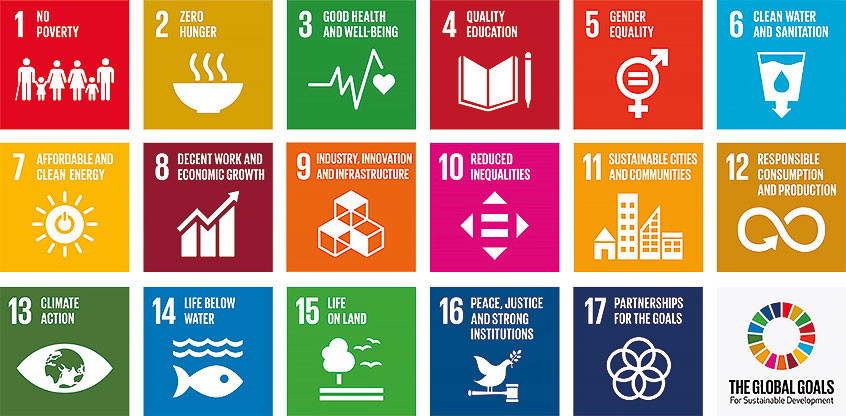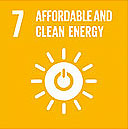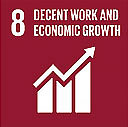

Based on our materiality analysis, we have identified which priority areas of sustainability and which measurable goals Compotech should work towards. The materiality analysis is based on the UN's Global Goals. Below we describe the process for the materiality analysis; how we contribute both positively & negatively to different goals and about the prioritized goals that Compotech works from.
On 25 September 2015, UN member states adopted Agenda 2030 with the aim of creating sustainable development. This includes the Global Goals SDG, Sustainable Development Goals. These include seventeen goals that are divided into 169 sub-goals that will lead the world towards a sustainable and fair future. Agenda 30 means that the goals will be achieved by the year 2030.
For this to be possible, a great deal of commitment is required from all of us. We have a responsibility to work with customers and suppliers to drive a sustainable future for the planet and future generations.
All 17 goals are equally important for achieving sustainable development. Several of the goals are dependent on and have a direct connection to other goals. This means that when success is achieved within one goal, it has positive effects on other goals. With our own integration of the Global Sustainability Goals, we have laid the foundation for our work and our own goals for sustainable development. Our vision with this is to create solutions and products that contribute to a more sustainable world by working for reduced electricity, water, and chemical use.
A prerequisite for sustainable development is that we look after all the people who affect our business. This includes our customers, suppliers, employees, partners, and the communities in which we operate.

We have selected 4 goals as our main focus, goals where we have a responsibility to improve and the work we are proud of. One of our business areas is Smart Lighting. This area has a particularly clear link to UN Goal number 7, Sustainable energy for all.
Here we discuss activities and talk about what we do to contribute to the global environmental goals. We do this by explaining what goals Compotech operates within and how we can improve areas where we have a negative impact through innovative and concrete decisions.
Areas where we through our operations can have the greatest positive effects.

How we through our business have or can potentially have a direct or indirect positive effects.

Where we, through our work for the global goals, have a responsibility to mitigate the potential negative impact on people, society, and the environment.


Among the 169 sub-goals, we have identified four goals that are most relevant because it is among these that we have the greatest positive and negative impact.
 This area is mainly relevant to Compotech from a mitigating and minimizing perspective for potential negative effects on human health. Furthermore, it is about the care of our employees. That the staff get the best conditions for a healthy life, have access to health care, insurance, and training in road safety. There is also the possibility of reducing the number of deaths and diseases from air pollution by reducing particulate emissions from global freight and the use of hazardous chemicals.
This area is mainly relevant to Compotech from a mitigating and minimizing perspective for potential negative effects on human health. Furthermore, it is about the care of our employees. That the staff get the best conditions for a healthy life, have access to health care, insurance, and training in road safety. There is also the possibility of reducing the number of deaths and diseases from air pollution by reducing particulate emissions from global freight and the use of hazardous chemicals.
 Compotech’s impact on this goal is related to modern and sustainable lighting technology. We do this through our Smart Lighting business area, which accounts for approximately 10-15% of total sales. By supplying the market and developing modern technology for operating and controlling LED luminaires, we contribute to achieving the greatest possible energy savings when it comes to lighting. This applies to both public and private environments, where our presence sensors are examples of products that prevent lighting from being switched on unnecessarily when no one is around. In this way, we prevent the lighting from being switched on unnecessarily and consuming energy.
Compotech’s impact on this goal is related to modern and sustainable lighting technology. We do this through our Smart Lighting business area, which accounts for approximately 10-15% of total sales. By supplying the market and developing modern technology for operating and controlling LED luminaires, we contribute to achieving the greatest possible energy savings when it comes to lighting. This applies to both public and private environments, where our presence sensors are examples of products that prevent lighting from being switched on unnecessarily when no one is around. In this way, we prevent the lighting from being switched on unnecessarily and consuming energy.
We also have a responsibility to ensure that our suppliers choose renewable energy to be able to achieve this goal together.
 For us this might seem obvious but might not be clearly defined in developing countries. It is important to us to ensure human and labor rights in the supply chain. We save time, increase profitability, and add knowledge.
For us this might seem obvious but might not be clearly defined in developing countries. It is important to us to ensure human and labor rights in the supply chain. We save time, increase profitability, and add knowledge.
 As a significant environmental aspect for Compotech’s operations, climate measures are a key goal for us. Our vision is of course to strive for a zero vision in our net emissions of CO2 related to our business. By following this vision, it drives our work forward. As Compotech grows, so does our climate footprint, so this becomes a challenge, and we work actively to achieve our set environmental goals to reduce emissions.
As a significant environmental aspect for Compotech’s operations, climate measures are a key goal for us. Our vision is of course to strive for a zero vision in our net emissions of CO2 related to our business. By following this vision, it drives our work forward. As Compotech grows, so does our climate footprint, so this becomes a challenge, and we work actively to achieve our set environmental goals to reduce emissions.